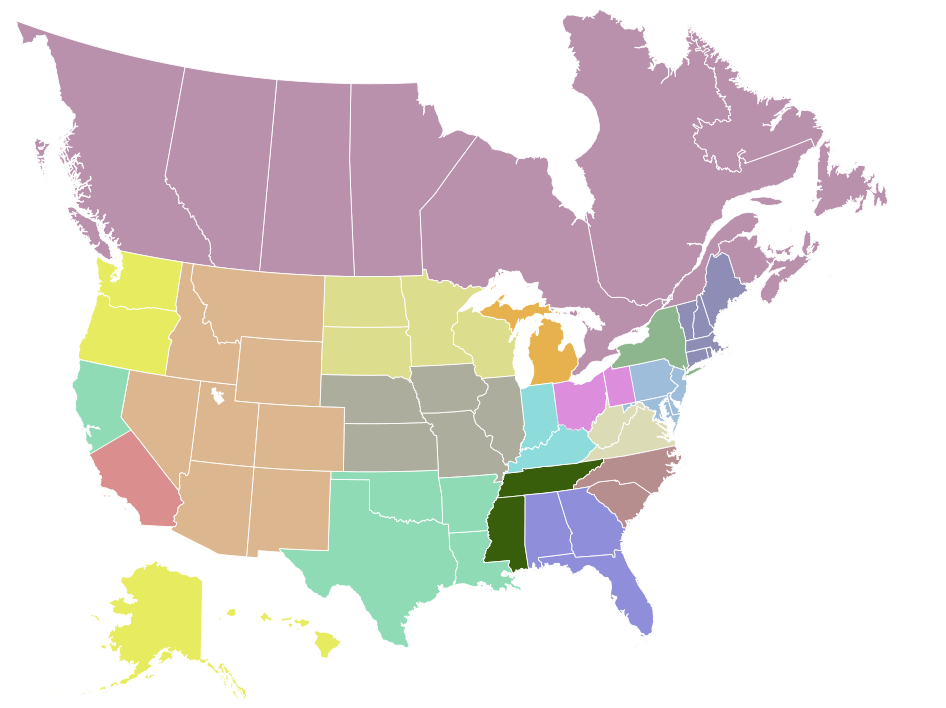REGIONAL GROUPS
Unlike most other registries, SVS VQI hosts biannual regional meetings that allow physicians, nurses, data managers, quality officers, and more to meet in a supportive, collaborative environment. VQI collects preoperative and one-year follow-up data to generate real-time benchmarked reports of performance measures, major outcomes, and complications for assessing the quality of care and determining best practices in vascular surgery. Regional quality groups share and analyze this data to initiate quality improvement projects. Many groups identify an area for quality improvement, then launch region-wide efforts to improve care at the local level.
CURRENT REGIONAL
QUALITY GROUPS
IMPORTANCE OF
REGIONAL GROUPS
REgional Group Meetings
REGIONAL
PROJECTS
IMPORTANCE OF REGIONAL GROUPS
Through regional quality group meetings, participants share and analyze collected data to initiate quality improvement projects to reduce complications, readmissions, and length of stay. Quality improvements projects can translate directly to hospital cost reduction. With continued expansion of the SVS VQI and regional quality groups, data will more rapidly accumulate and can be leveraged for benchmarking and quality improvement initiatives.
Benefits of regional quality group participation include:
- Anonymous, benchmarked reports for comparison
- Increasing power and ability to detect root causes of outcomes
- Facilitating & initiating quality improvement projects
- Access to blinded datasets for data analysis at regional and national level
- Improving long-term patient surveillance
Regional group Meetings
Regional meetings are a cornerstone of the development of best practice within the VQI. The meetings are held twice a year in each of the 18 regions and the meetings are free to attend. Also, some regional meetings are open to non-members either from an existing VQI center or a prospective center interested in learning more.
Typically, the meetings include:
- Review of de-identified regional dashboards and discussion of best practice
- Presentation and discussion of region-specific data analyses of outcomes and one-year follow-up data
- Presentation and discussion of quality improvement projects at the center and/or regional level
- National updates of registry changes and key metrics
The schedule for Spring and Fall Meetings and minutes of past meetings are available on each region’s web pages.
Regional Projects
View a selection of regional projects for ongoing quality improvement and cost reductions. Abstracts and poster for center-specific projects can be viewed by members in the Members Only National Section.
Regional Quality Group Map
Regional Quality Groups are a key component of the SVS VQI – find the regional group in your area on interactive map below.
Roll over the map and click on a Regional Quality Group below for more information.

Current Regional Groups
Canadian Vascular quality initiative
Great Lakes Vascular study group
Carolinas vAscular quality group
Michigan vascular study group
Mid-America Vascular Study Group
Mid-Atlantic vascular study group
Mid-South vascular study group
Midwest vascular collaborative
Northern California vascular study group
Pacific Northwest Vascular study group
Rocky Mountain vascular quality initiative
Southeastern vascular study group
Southern California Voice
Southern vascular outcomes network
Virginias Vascular study group
Upper Midwest vascular network
vascular study group of Greater New York
Vascular study group of New England
RELATED RESOURCES, NEWS & EVENTS
Get the latest news and announcements from VQI.
HAVE QUESTIONS?
LET US HELP!
If you have additional questions, or if you are interested in joining the SVS VQI, contact our specialists today! You can reach out by email at vqi@fivoshealth.com or by phone at 603-298-0263. Or fill out our interest form by clicking here.
The schedule for Spring and Fall Meetings and minutes of past meetings are available on each region’s web pages.
SVS VQI’s 14 registries contain demographic, clinical, procedural and outcomes data from over one million vascular procedures performed nationwide, in Canada, and Singapore. Each record includes information from the patient’s initial hospitalization and at one-year follow-up. Click here to learn more.
Directed by a Governing Council of representatives from the SVS, AVF, SVM and regional quality groups, the mission of the SVS PSO is to improve patient safety and the quality of health care delivery by providing web-based collection, aggregation, and analysis of clinical data submitted in registry format for all patients undergoing specific vascular treatments. Click here to learn more.
The SVS PSO, together with Fivos, develops quality improvement (QI) tools to assist VQI members and other vascular specialists, quality improvement staff and hospital administrators with their own vascular quality programs. Some of these tools are available to VQI members only, but other materials will be available here.
SVS VQI physicians may request de-identified datasets from each SVS VQI registry for analysis. The SVS PSO Arterial Research Advisory Council (RAC) reviews and evaluates requests for datasets by investigators, who provide the RAC with a description of their proposed project. Click here to get started.
